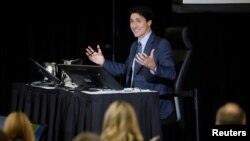Canadian Prime Minister Justin Trudeau testified at a public inquiry on Friday to defend his use of emergency powers to dislodge noisy trucker-led protestors that jammed the capital earlier this year.
His testimony at the Public Order Emergency Commission wraps up six weeks of hearings on the rarely used powers, which were invoked in February after weeks of protests that brought Ottawa to a standstill and disrupted trade.
Trudeau began by saying he'd taken note of "a level of frustration and dissatisfaction with government policies" in relation to COVID rules in the months before the protest.
The self-styled "Freedom Convoy" of truckers rolled into the capital on January 29 from across Canada to express anger at COVID vaccine mandates.
As solidarity rallies popped up – blocking trade corridors including a bridge to Detroit that is the busiest international crossing in North America – their demands expanded to a broader rejection of pandemic restrictions and an anti-establishment agenda.
"The intensity, the anger, the hateful rhetoric," Trudeau said, was reminiscent of what he had faced during a recent election when he was struck by stones thrown at a campaign stop.
He said police had assured him this would be "a normal protest that we regularly see" in Ottawa and the truckers and company would go home after the first weekend.
Two weeks in, more trucks continued to roll into Ottawa to join in the demonstration, which by then was dug in.
The use of the Emergencies Act to remove the noisy, street-jamming protests and blockades was criticized as overreach by political opponents and civil liberties groups.
The commission has been mandated to assess the "appropriateness and effectiveness of the measures" taken by the government to deal with the protests. It is not empowered to level sanctions, but its policy review could include recommendations to update the 1988 act.
The commission, led by former judge Paul Rouleau, has heard from officials, protest leaders and Ottawa residents impacted by the big rigs' incessant honking and diesel fumes.
"It was a tinder box waiting to explode. It was not a family festival," former Ottawa police chief Peter Sloly testified.
He resigned during the crisis over what the commission heard was a disorganized police response, including intelligence failures and leaks -- both now under investigation.
Convoy organizers have painted a much different picture, calling their actions legitimate pushback against "evil" policies and describing a festive atmosphere in front of Parliament with hot tubs, bouncy castles and barbecues.
"We weren't there to disrupt the city residents," trucker Brigitte Belton told the inquiry. "We were there to be heard."
The commission heard evidence of incendiary comments and extremist elements of the protest that included calls for a coup and the spread of conspiracy theories.
Deputy Prime Minister Chrystia Freeland testified on Thursday that the protests risked damaging investor confidence and "doing long-term and possibly irreparable harm to our trading relationship with the United States."
Text messages between officials, and readouts of calls with bankers and the White House in Washington showed frustrations rising as Ottawa and the provinces struggled to bring the protest movement to heel.
One banker relayed to Freeland an investor's description of Canada amid the chaos as a "banana republic" while a provincial premier accused the feds of stoking protestor anger by "calling them all Nazis."
Earlier this week, Trudeau's national security adviser, Jody Thomas, told the commission she recommended invoking the Emergencies Act as the protests were "causing significant economic instability. The violent rhetoric was increasing rapidly and exponentially, (and) the number of threats against public figures was increasing."
Those included threats against Freeland, saying she would "get a bullet to the head" for "lying about COVID-19."
Police eventually moved in, towing the big rigs out of Ottawa in a crackdown that saw nearly 200 arrests.
Also, a cache of guns was seized and four people involved in blockading the Coutts, Alberta border crossing were charged with conspiring to murder RCMP officers.




